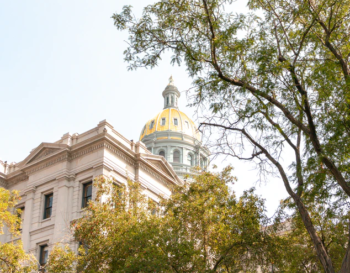Colorado Tobacco and Nicotine Taxes to Rise Jan. 1 After Voters Overwhelmingly Approve Proposition EE
 Colorado’s tobacco taxes will increase significantly and vape products with nicotine will be taxed for the first time starting Jan. 1 because voters approved a statewide ballot issue this November.
Colorado’s tobacco taxes will increase significantly and vape products with nicotine will be taxed for the first time starting Jan. 1 because voters approved a statewide ballot issue this November.
More than two-thirds of voters supported Proposition EE. The measure, which was placed on the statewide ballot by the Colorado General Assembly, needed only a majority of votes to pass.
Proposition EE raises taxes on cigarettes and tobacco products, and establishes a new tax on nicotine products, including vaping products. The new taxes will increase incrementally until they are fully phased in by 2027.
Until the tax increase goes into effect, Colorado’s tax on cigarettes is relatively low compared to other states, ranking 39th, according to the Campaign for Tobacco Free Kids. Colorado was one of 26 states without a tax on nicotine vaping products.
When the new taxes go into effect on Jan. 1, Colorado will rank 24th nationally in terms of its tobacco tax.
Higher prices of tobacco products are proven to help reduce tobacco consumption. The Colorado QuitLine (1-800-Quit-Now) provides free, customized support for adults and youth looking to quit smoking, chewing or vaping.
The Details
The current state cigarette tax is 84 cents per pack. It increases in 2021 to $1.94 per pack and caps out at $2.64 in 2027 for a total increase of $1.80 per pack.
The tax on other tobacco products, which includes cigars, chew and other products made with the tobacco leaf, will increase from its current rate of 40% to 62% of price by 2027.
With the passage of Proposition EE, the new tax on vape products will start at 30% in 2021 and increase to 62% in 2027. Vaping products and devices that do not contain nicotine are not subject to the tax.
These new tax rates also include a special rate for what are called “modified risk tobacco products,” which are federally designated as having lower health risks compared to existing commercial products. They would be taxed at 35% of the manufacturer’s list price. While these products are labeled “modified risk”, no tobacco product is safe or harmless to use, especially by people who are non-smokers.
The U.S. Food and Drug Administration authorized the marketing of Philip Morris Products S.A.’s “IQOS Tobacco Heating System” as modified risk tobacco products in July.
The new law also establishes a minimum tax for moist snuff products at $1.48 per 1.2 ounce container, increasing to $2.26 by 2027-28. Moist snuff is smokeless tobacco that can be loose or pouched and is intended to be placed in the mouth.
It also sets the minimum after‑tax price of cigarettes for consumers at $7 per pack beginning in January 2021, and $7.50 per pack beginning in July 2024. Raising the price of tobacco products has been shown to reduce use.
Online sales from out-of-state retailers to Colorado consumers are subject to the new taxes.
Where the New Revenue Will Go
Proposition EE is expected to generate up to $175.6 million in cigarette, tobacco, and nicotine tax revenue in budget year 2021-22, the first full year the measure will be in effect, and up to $275.9 million when the new tax rates are fully phased in.
The measure allocates the revenue to spending on a formula that evolves over time.
The tax revenue will go to pay for preschool, rural schools, K-12 education, affordable housing, legal assistance for people facing eviction, and general state spending.
Also receiving funding is Medicaid, primary care, tobacco education programs, children’s health and a variety of other health care programs that currently receive cigarette and tobacco tax revenue.
Revenues from these taxes will begin to go towards programs to reduce youth tobacco use, support cessation and reduce exposure to secondhand smoke exposure throughout Colorado in 2024. The funding will begin at $20 million, and is estimated to increase to $30 million per year by 2027.
A summary of Proposition EE starts on page 30 of the state Blue Book, the informational resource for voters.